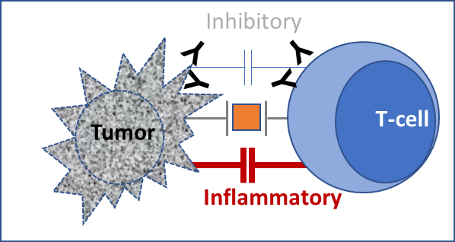Tumor Immunotherapy with checkpoint inhibitors
You are here
- Immune checkpoint inhibitors suppress tumor-derived inhibitory signals, making tumor cells ‘visible’ to the immune system (Fig. 3).
- The patient’s immune system can therefore ‘see’ the tumor, and mount an anti-tumor immune response to eliminate the tumor.
- These drugs have dramatically improved the landscape of cancer therapy. However, efficacy failures have occurred during some clinical trials. Debilitating side effects have also occurred due to a non-specific immune response against normal tissues and organs.

Fig. 3. CHECKPOINT INHIBITORS & ANTI-TUMOR IMMUNE RESPONSE: Inhibitors such as anti-PD1 bind to and neutralize T-cell-bound inhibitory receptors such as PD-1. Others like anti-PD-L1 bind to and neutralize inhibitory ligands such as PD-L1, which are overexpressed on tumor cells. This binding suppresses inhibitory signals. As a result, inflammatory signals are enhanced. The tumor undergoes immune attack and is eliminated. Autoimmune side effects are also possible.
